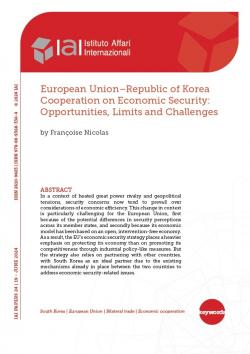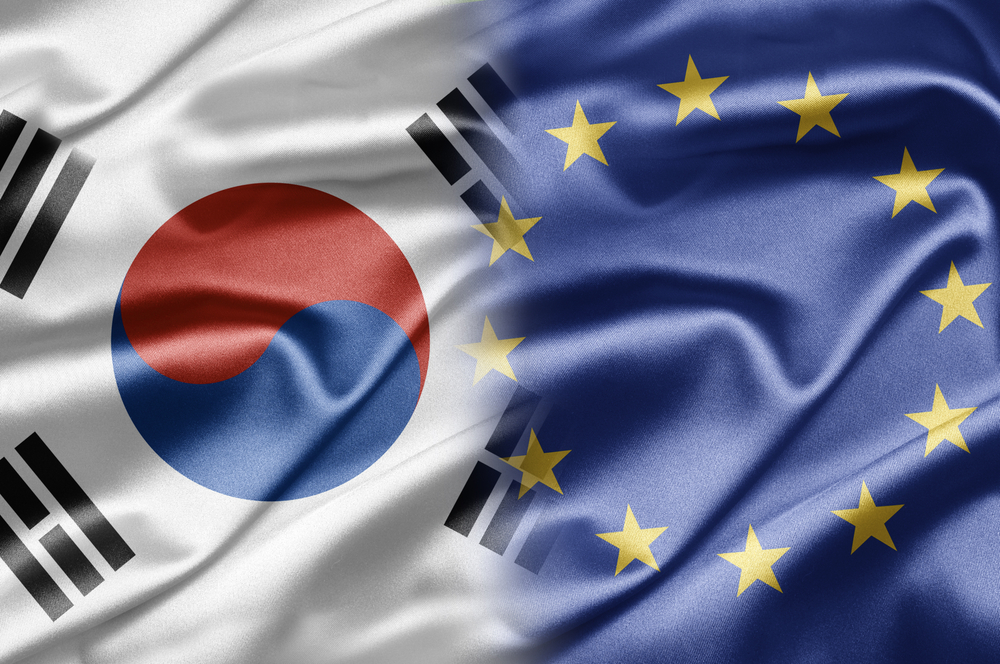European Union–Republic of Korea Cooperation on Economic Security: Opportunities, Limits and Challenges

This piece is a revised version of a paper presented at the conference on “New Convergences in EU-ROK Economic Security Relations”, organised in Rome on 30 January 2024 by the Istituto Affari Internazionali (IAI).

In a context of heated great power rivalry and geopolitical tensions, security concerns now tend to prevail over considerations of economic efficiency. This change in context is particularly challenging for the European Union, first because of the potential differences in security perceptions across its member states, and secondly because its economic model has been based on an open, intervention-free economy. As a result, the EU’s economic security strategy places a heavier emphasis on protecting its economy than on promoting its competitiveness through industrial policy-like measures. But the strategy also relies on partnering with other countries, with South Korea as an ideal partner due to the existing mechanisms already in place between the two countries to address economic security-related issues.
Table of content
Introduction
1. The rise of economic security concerns
1.1 The discontent with globalisation
1.2 Defining economic security
2. The EU and economic security
2.1 The need for a paradigm shift in the EU
2.2 The EU’s economic security strategy: Derisking as a priority
2.3 The instruments of EU’s economic security strategy
3. Scope for cooperation on economic security
3.1 General considerations on the challenges of bilateral cooperation
3.2 The way forward
References
>>> Read the article on the Instituto Affari Internazionali's website.

Available in:
Regions and themes
ISBN / ISSN
Share
Related centers and programs
Discover our other research centers and programsFind out more
Discover all our analysesJapan’s Takaichi Landslide: A New Face of Power
Prime Minister Sanae Takaichi has turned her exceptional popularity into a historic political victory. The snap elections of February 8 delivered an overwhelming majority for the Liberal Democratic Party (LDP), driven by strong support from young voters, drawn to her iconoclastic and dynamic image, and from conservative voters reassured by her vision of national assertiveness. This popularity lays the foundation for an ambitious strategy on both the domestic and international fronts.
The U.S. Policy Toward Taiwan Beyond Donald Trump: Mapping the American Stakeholders of U.S.-Taiwan Relations
Donald Trump’s return to the White House reintroduced acute uncertainty into the security commitment of the United States (U.S.) to Taiwan. Unlike President Joe Biden, who repeatedly stated the determination to defend Taiwan, President Trump refrains from commenting on the hypothetical U.S. response in the context of a cross-Strait crisis.

China’s Strategy Toward Pacific Island countries: Countering Taiwan and Western Influence
Over the past decade, China has deployed a diplomatic strategy toward the Pacific Island Countries (PICs). This strategy pursues two main objectives: countering Taiwan's diplomatic influence in the region and countering the influence of liberal democracies in what Beijing refers to as the "Global South."

Opening up the G7 to South Korea to Address Contemporary Global Challenges
The G7’s global influence has diminished as powers like China reshape international governance through initiatives such as BRICS and the Shanghai Cooperation Organisation (SCO). With the G7 now representing just 10 per cent of the world’s population and 28 per cent of global GDP, its relevance is increasingly questioned.










